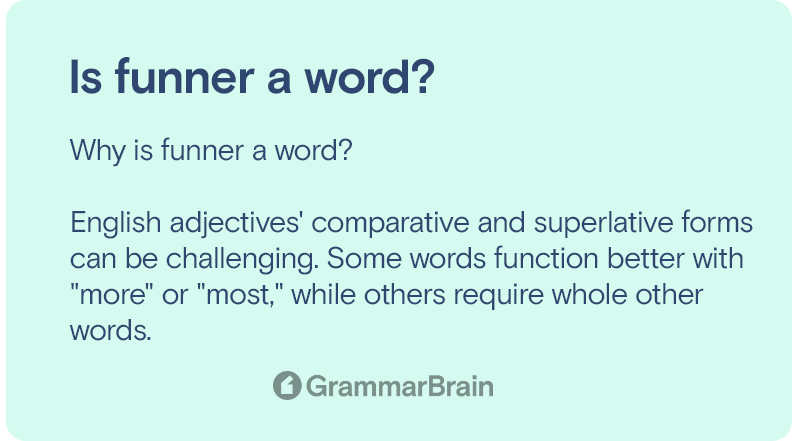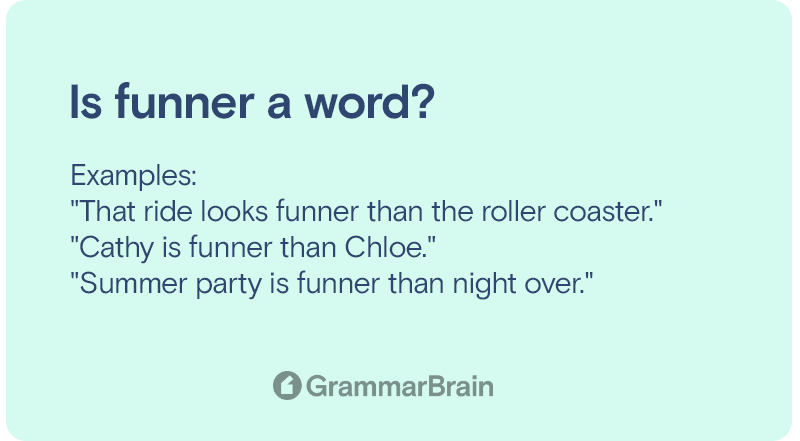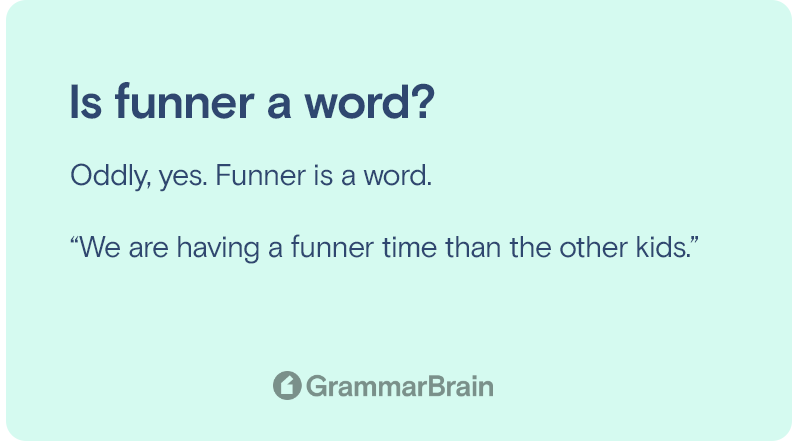Have you ever heard of the word “funner?” Is “funner” a word? The actual word is “more fun” right? In this article I am going to describe that is funner a word? Is it grammatically correct or not? Let’s jump right in and answer these questions.

Is funner a word?
When you first heard the word funner you definitely thought it is a funny word.
The word “funner” is a comparative of the adjective “Fun”, which is used to compare the levels of the word fun in two things.
Comparisons of objects like activities are made using it. By utilizing the slang word “funner,” you may compare pretty much anything that is amusing to something else that is amusing.
It is often used to describe things or people that are enjoyable. It occasionally describes frivolous things.
As the comparative and superlative forms of fun, many individuals, possibly even most people, greatly favor “More fun” and “Most fun” over “Funner” and “Funnest.” Despite acknowledging this spelling, several dictionaries nevertheless classify the adjective form as informal.

Is funner grammatically correct?
English adjectives’ comparative and superlative forms can be challenging. Some words function better with “more” or “most,” while others require whole other words. Some like to be adjusted (affix) with “-er” or “-est.”
It’s simple to find exceptions to any rule regarding these terms. For instance, although there are hundreds of uses of “Badder” and “Baddest” spanning across a wide variety of ages and registers, bad typically becomes “Worse” and “Worst.”
Adjectival words
“Sometimes funner; sometimes funnest” is how we describe adjectival fun. This is because a lot of people actually do use these terms, and a lot of people also strongly prefer that things be made to be “More Fun” or “Most Fun.”
More fun or funner?
“Funner” is not grammatically incorrect. Both “funner” and “more fun” can be used to compare two fun things or a fun time.
Although it’s common to hear the attributive adjective “fun” used in an informal context, using the comparative and superlative forms “funner” as if fun were a regular adjective, is entirely different.

Why funner does not sound right
The word “fun” is one of the few adjectives with two grammatically acceptable comparative forms, one adding the word more to the front and the other ending in “-er.”
In this instance, the former is regarded as more informal than the latter.
Consideration of funner in relation to other comparative adjectives is beneficial. Some versions completely alter the word, such as how the comparative adjective for good is better.
Other words, like more courageous, require the prefix “more” before the adjective.
Then there are the comparatives, which do everything in one word while mostly maintaining the adjective’s original meaning.
Examples of using “funner”
Though many educated people consider “Funner” a nonstandard word, there are some examples of using Funner.
The examples are:
- “That ride looks funner than the roller coaster.”
- “Cathy is funner than Chloe.”
- “Summer party is funner than night over.”
Conclusion
Even though the terms “funner” and “funnest” exist, you shouldn’t use them without anticipating that some people would find them odd.
Expect your teacher to give you underlined edits and disappointed sighs in equal measure if you include them in a term paper.
However, words that cause people to feel dissatisfied are still just words; if they didn’t actually exist, there would be nothing to be unhappy about.
FAQs
Is the word funner in the dictionary?
Yes, funner is a word. Though it is used informally, it is better to use more fun than funner to not to pick up on by over-educated people.
Is funner grammatically correct?
Yes, funner is grammatically correct. Although many people prefer to use more fun and most fun, the comparative and superlative forms of the word funner and funnest have been in use for more than a century. Some people find it amusing to use the adjective “fun” in this way.
Why is funner considered a nonstandard word?
A nonstandard word is a word that educated speakers don’t confirm as being real (like slang). Funner is one such word that educated speakers do not confirm. That is why it is considered a nonstandard word.
Inside this article
Fact checked:
Content is rigorously reviewed by a team of qualified and experienced fact checkers. Fact checkers review articles for factual accuracy, relevance, and timeliness. Learn more.
Core lessons
Glossary
- Abstract Noun
- Accusative Case
- Anecdote
- Antonym
- Active Sentence
- Adverb
- Adjective
- Allegory
- Alliteration
- Adjective Clause
- Adjective Phrase
- Ampersand
- Anastrophe
- Adverbial Clause
- Appositive Phrase
- Clause
- Compound Adjective
- Complex Sentence
- Compound Words
- Compound Predicate
- Common Noun
- Comparative Adjective
- Comparative and Superlative
- Compound Noun
- Compound Subject
- Compound Sentence
- Copular Verb
- Collective Noun
- Colloquialism
- Conciseness
- Consonance
- Conditional
- Concrete Noun
- Conjunction
- Conjugation
- Conditional Sentence
- Comma Splice
- Correlative Conjunction
- Coordinating Conjunction
- Coordinate Adjective
- Cumulative Adjective
- Dative Case
- Determiner
- Declarative Sentence
- Declarative Statement
- Direct Object Pronoun
- Direct Object
- Diction
- Diphthong
- Dangling Modifier
- Demonstrative Pronoun
- Demonstrative Adjective
- Direct Characterization
- Definite Article
- Doublespeak
- False Dilemma Fallacy
- Future Perfect Progressive
- Future Simple
- Future Perfect Continuous
- Future Perfect
- First Conditional
- Irregular Adjective
- Irregular Verb
- Imperative Sentence
- Indefinite Article
- Intransitive Verb
- Introductory Phrase
- Indefinite Pronoun
- Indirect Characterization
- Interrogative Sentence
- Intensive Pronoun
- Inanimate Object
- Indefinite Tense
- Infinitive Phrase
- Interjection
- Intensifier
- Infinitive
- Indicative Mood
- Participle
- Parallelism
- Prepositional Phrase
- Past Simple Tense
- Past Continuous Tense
- Past Perfect Tense
- Past Progressive Tense
- Present Simple Tense
- Present Perfect Tense
- Personal Pronoun
- Personification
- Persuasive Writing
- Parallel Structure
- Phrasal Verb
- Predicate Adjective
- Predicate Nominative
- Phonetic Language
- Plural Noun
- Punctuation
- Punctuation Marks
- Preposition
- Preposition of Place
- Parts of Speech
- Possessive Adjective
- Possessive Determiner
- Possessive Case
- Possessive Noun
- Proper Adjective
- Proper Noun
- Present Participle
- Prefix
- Predicate



